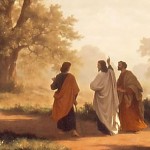by Fr. Patrick Henry Reardon
 We have reflected that the “passive” idiom of the Lord’s Resurrection was derived from the Apostolic kerygma, in which that event was proclaimed as the climax of God’s interventions in the History of Salvation:
We have reflected that the “passive” idiom of the Lord’s Resurrection was derived from the Apostolic kerygma, in which that event was proclaimed as the climax of God’s interventions in the History of Salvation:
‘After He had performed all His wonders for Israel over the centuries, God raised Jesus.’
Now, what can we say about the more active style rhetoric we find in John and Mark? Is it possible to determine the source of this active idiom? In other words, can we identify what kind of setting prompted Christians to proclaim, ‘Jesus rose’ or ‘ Christ is risen,’ instead of ‘Jesus was raised’
A compelling answer to this question is indicated, I believe, near the end of Luke’s Gospel, where Jesus commissions the Apostles. He says,
“These are my words which I spoke to you, still being with you: It is necessary (dei) that everything written about me—in the Law of Moses, in the Prophets, and in the Psalms—be fulfilled.”
And what were all those written things—panta ta gegrammena—awaiting fulfillment? The explanation follows directly: “Thus it is written that the Messiah suffers and rises (anastenai) from the dead on the third day” (Luke 24:44-46).
In this text the necessity (dei) of the Scriptures’ fulfillment is what established the context to understand the Resurrection of Christ; the Messiah must do what the Scriptures declare he will do. And the Scriptures declare that he will rise on the third day. The proper interpretation of Holy Scripture, then, was the setting that prompted Christians to say,
‘Jesus rose,’
rather then
‘Jesus was raised.’
This theme is important in Luke’s final chapter, where a certain necessity (dei) attends the Resurrection, as well as the Passion, inasmuch as both were prophesied. Working backwards from Luke’s Great Commission, let us examine the central and dominant story in that chapter, which tells of the two disciples walking toward Emmaus.
Jesus, in his discussion with them, poses and then answers a rhetorical question:
“Then he said to them, “‘O foolish ones, and slow of heart to believe in all that the prophets have spoken. Was it not necessary (edei) for the Messiah to suffer these things and to enter into His glory?’ And beginning from Moses and from all the Prophets, he interpreted (diermenesen) for them, in all the Scriptures, the things that concerned himself” (Luke 24:25-27).
According to this text, the Law and the Prophets bore witness, not only that the Messiah should suffer, but also that he should “enter into glory.” The latter expression, as it appears at this place in Luke, clearly refers to the Resurrection. This, too, he must do, because Moses and the Prophets foretold it. The Messiah must enter into his glory, because the Hebrew Scriptures said so.
Again, working backwards from Emmaus to the initial scene in Luke 24, we come to the message of the angels to the Myrrhbearing Women. Here we observe that the author preserves a presentation of the Resurrection that is both passive and active. First, the angelic heralds at the empty tomb ask the Myrrhbearers,
“Why do you seek the living among the dead? He is not here, but he has been raised (egerthe).”
Then, by way of explaining the matter, the angels remind the women,
“Remember how he spoke to you, being yet in Galilee, saying, ‘The Son of Man must (dei) be delivered into the hands of sinful men, and be crucified, and the third day rise again (anastenai)’ (Luke 24:5-7).
This text prompts a further observation: Whereas the two later pericopes in Luke (the Emmaus story and the Great Commission) refer to Jesus as the Messiah (ho Christos), this earlier scene at the tomb calls him, “the Son of Man.” The reason for this is very simple; the angelic message explicitly refer to Luke’s earlier prophecy, in which Jesus declared,
“The Son of Man must (dei) suffer many things, and be rejected by the elders and chief priests and scribes, and be killed, and be raised (egerthenai) the third day” (9:22).
That is to say, the reference to the earlier prophecy in Luke obliges his use of the same expression.
It was necessary, then, that Jesus, both as Messiah and as Son of Man, should rise from the dead, because his Resurrection was a point of biblical prophecy.
It is time, perhaps, to inquire which Old Testament prophecies the Gospels had in mind.
